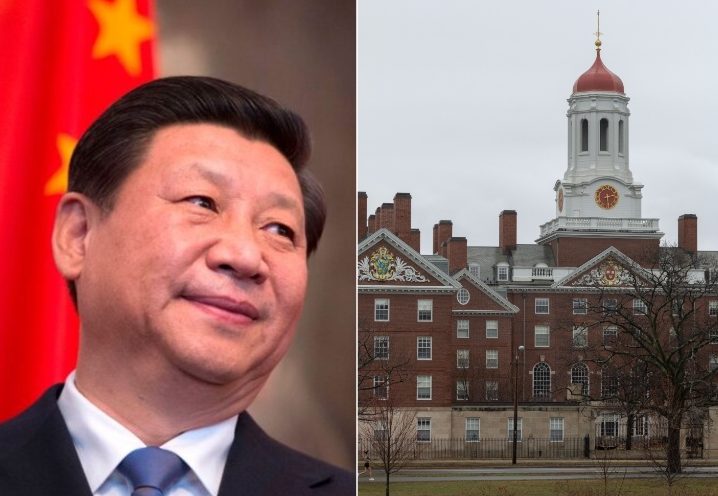‘Training the XPCC risked complicity in Beijing’s atrocities against Uyghurs and other ethno-religious minorities,’ foreign policy expert says

Harvard University quietly trained members of a Chinese “paramilitary organization” on two occasions after the U.S. government sanctioned the group for its role in the Uyghur genocide. The Ivy League institution could face “a big legal problem” as a result, according to one foreign policy expert.
In 2019, Harvard’s T.H. Chan School of Public Health partnered with Beijing’s National Health Security Administration (NHSA) to launch an annual health financing course, training government staffers from across China. Harvard originally noted in a blog post that officials with the Xinjiang Production and Construction Corps (XPCC) participated in the inaugural training, but that language was scrubbed following a Washington Free Beacon inquiry.
The Trump administration sanctioned the XPCC in 2020 “in connection with serious rights abuses against ethnic minorities in the Xinjiang Uyghur Autonomous Region,” describing it as a “paramilitary organization … that is subordinate to the Chinese Communist Party.” But Harvard continued to train its members, once in 2023 and again in 2024. On those occasions, the Ivy League university didn’t include their participation on its webpages.
China-focused research group Strategy Risks first uncovered the 2023 training in a recent report titled, “Beijing Exercises Strong Influence Over Multiple Areas of Harvard University.” XPCC officials’ 2024 involvement, noted on the NHSA’s website, has not been previously reported.
The revelation comes as Harvard faces mounting challenges, with the Trump administration freezing more than $2 billion in federal funding over the university’s failure to combat campus anti-Semitism. Since the sanctions restrict U.S. entities from engaging with the XPCC, Hudson Institute senior fellow Michael Sobolik believes Harvard could face legal trouble, including hundreds of thousands of dollars in fines.
“It’s one thing to partner with the XPCC before the U.S. government declared a genocide in Xinjiang. It’s another thing entirely to continue that cooperation afterwards,” Sobolik told the Free Beacon. “Harvard officials should have known that training the XPCC risked complicity in Beijing’s atrocities against Uyghurs and other ethno-religious minorities. Either they didn’t, and it’s gross negligence—or they did, and it’s beyond the pale. Either way, Harvard may have a big legal problem.”
China has long faced accusations that it subjected its Uyghur population to mass arbitrary detentions, forced sterilizations, involuntary organ harvesting, and unethical medical experiments.
The Chan School of Public Health’s dean for communications and strategic initiatives, Stephanie Simon, blamed China for XPCC’s inclusion in the trainings. And when asked about the language removed from the 2019 post, she said an “enormous quantity of old content was removed across every department, center, and research site” as part of a website redesign from “several months ago.”
“Each year, the NHSA invites the local officials who administer health insurance and elder care programs in each administrative region of China. In Xinjiang, that often includes officials from the XPCC. The trainings, held in different cities each year, typically draw 50 or 60 local officials from across China, with just one or two from each administrative region attending. The instructors come from multiple countries and many academic institutions, not just Harvard,” Simon said.
“[Harvard China Health Partnership’s] goal with these trainings is straightforward: To build capacity for public officials across China to create effective insurance programs with sustainable financial models so that all people across China can get access to high-quality health care,” she added. “Our research, education, and community engagement work in China is driven by individual faculty members who view it as essential to advancing the school’s mission of improving health and well-being for all.”
Harvard has routinely faced scrutiny over its funding from Beijing and other Chinese entities. The university raked in nearly $70 million from China between 2019 and 2022, more than any other country during that time period, according to U.S. Department of Education data.
Connections between China and Harvard’s School of Public Health trace back to at least 2014 when the university accepted a $350 million gift from the Morningside Foundation, a group controlled by the Chan family. The university renamed the school after the late father of Gerald Chan, a Hong Kong real estate magnate, and Ronnie Chan, who has deep ties to Beijing and the CCP. Harvard, however, has maintained that the gift was “unsolicited, unrestricted, and unexpected.”
To date, Harvard has trained hundreds of CCP government officials through its partnership with China. At its 2022 program alone, the university trained “188 senior national and provincial-level government officials from China’s National Healthcare Security Administration.”
Harvard’s health partnership includes seven Chinese universities, six of which the Australian Strategic Policy Institute lists as serious security risks due to their ties to the People’s Liberation Army. Three of those—Sichuan, Xi’an Jiaotong, and Tsinghua universities—help develop technologies for Chinese defense, including the Chinese nuclear program.
Original News Source – Washington Free Beacon
Running For Office? Conservative Campaign Management – Election Day Strategies!
